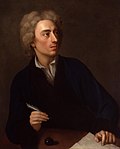Related Research Articles

Publius Vergilius Maro, usually called Virgil or Vergil in English, was an ancient Roman poet of the Augustan period. He composed three of the most famous poems in Latin literature: the Eclogues, the Georgics, and the epic Aeneid. A number of minor poems, collected in the Appendix Vergiliana, were attributed to him in ancient times, but modern scholars consider his authorship of these poems as dubious.

Alexander Pope was an English poet, translator, and satirist of the Enlightenment era who is considered one of the most prominent English poets of the early 18th century. An exponent of Augustan literature, Pope is best known for his satirical and discursive poetry including The Rape of the Lock, The Dunciad, and An Essay on Criticism, and for his translation of Homer.

Samuel Johnson, often called Dr Johnson, was an English writer who made lasting contributions as a poet, playwright, essayist, moralist, critic, biographer, editor and lexicographer. He was a devout Anglican, and a committed Tory. The Oxford Dictionary of National Biography calls him "arguably the most distinguished man of letters in English history". James Boswell's Life of Samuel Johnson was selected by Walter Jackson Bate as "the most famous single work of biographical art in the whole of literature".
Edmund Curll was an English bookseller and publisher. His name has become synonymous, through the attacks on him by Alexander Pope, with unscrupulous publication and publicity. Curll rose from poverty to wealth through his publishing, and he did this by approaching book printing in a mercenary and unscrupulous manner. By cashing in on scandals, publishing pornography, offering up patent medicine, using all publicity as good publicity, he managed a small empire of printing houses. He would publish high and low quality writing alike, so long as it sold. He was born in the West Country, and his late and incomplete recollections say that his father was a tradesman. He was an apprentice to a London bookseller in 1698 when he began his career.
Abraham Fraunce was an English poet.
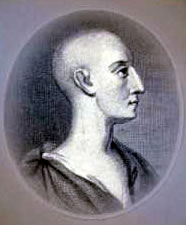
Ambrose Philips was an English poet and politician. He feuded with other poets of his time, resulting in Henry Carey bestowing the nickname "Namby-Pamby" upon him, which came to mean affected, weak, and maudlin speech or verse.

Sir Richard Blackmore, English poet and physician, is remembered primarily as the object of satire and as an epic poet, but he was also a respected medical doctor and theologian.
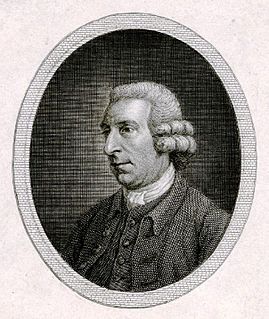
John Scott, known as Scott of Amwell, was an English landscape gardener and writer on social matters. He was also the first notable Quaker poet, although in modern times he is remembered for only one anti-militarist poem.

The Eclogues, also called the Bucolics, is the first of the three major works of the Latin poet Virgil.
William Diaper (1685–1717) was an English clergyman, poet and translator of the Augustan era. Having taken the wrong political side at a time of regime change, he lost the patrons who were advancing his career and died in obscurity shortly afterwards.

Baptista Spagnuoli Mantuanus was an Italian Carmelite reformer, humanist, and poet.
Nationality words link to articles with information on the nation's poetry or literature.
Nationality words link to articles with information on the nation's poetry or literature.
Thomas Cooke, often called "Hesiod" Cooke, was a very active English translator and author who ran afoul of Alexander Pope and was mentioned as one of the "dunces" in Pope's Dunciad. His father was an innkeeper. He was educated at Felsted. Cooke arrived in London in 1722 and began working as a writer for the Whig causes. He associated with Thomas Tickell, Ambrose Philips, Leonard Welsted, Richard Steele, and John Dennis. Cooke is the source of one of the primary biographies of John Dennis, which he wrote in Latin.
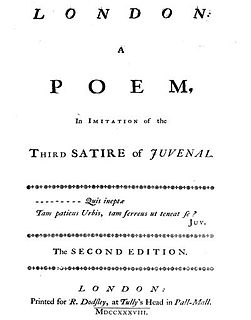
London is a poem by Samuel Johnson, produced shortly after he moved to London. Written in 1738, it was his first major published work. The poem in 263 lines imitates Juvenal's Third Satire, expressed by the character of Thales as he decides to leave London for Wales. Johnson imitated Juvenal because of his fondness for the Roman poet and he was following a popular 18th-century trend of Augustan poets headed by Alexander Pope that favoured imitations of classical poets, especially for young poets in their first ventures into published verse.

The Vanity of Human Wishes: The Tenth Satire of Juvenal Imitated is a poem by the English author Samuel Johnson. It was written in late 1748 and published in 1749. It was begun and completed while Johnson was busy writing A Dictionary of the English Language and it was the first published work to include Johnson's name on the title page.
Messiah is a 'sacred eclogue' by Alexander Pope, composed in 1712. It is based on the Fourth Eclogue of Virgil, and is an example of English Classicism's appropriation and reworking of the genres, subject matter and techniques of classical Latin literature.
A Biographical Sketch of Dr Samuel Johnson was written by Thomas Tyers for The Gentleman's Magazine's December 1784 issue. The work was written immediately after the death of Samuel Johnson and is the first postmortem biographical work on the author. The first full length biography was written by John Hawkins and titled Life of Samuel Johnson.
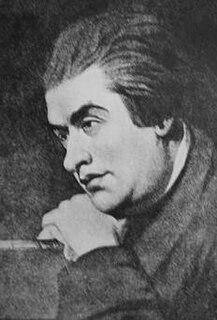
Samuel Johnson was an English author born in Lichfield, Staffordshire. He was a sickly infant who early on began to exhibit the tics that would influence how people viewed him in his later years. From childhood he displayed great intelligence and an eagerness for learning, but his early years were dominated by his family's financial strain and his efforts to establish himself as a school teacher.

Eclogue 4, also known as the Fourth Eclogue, is the name of a Latin poem by the Roman poet Virgil. Part of his first major work, the Eclogues, the piece was written around 40 BC, during a time of brief stability following the Treaty of Brundisium; it was later published in and around the years 39–38 BC. The work describes the birth of a boy, a supposed savior, who once of age will become divine and eventually rule over the world. During late antiquity and the Middle Ages, a desire emerged to view Virgil as a virtuous pagan, and as such, early Christians, such as Roman Emperor Constantine, early Christian theologian Lactantius, and St. Augustine—to varying degrees—reinterpreted the poem to be about the birth of Jesus Christ.
References
- Bate, Walter Jackson (1977), Samuel Johnson , New York: Harcourt Brace Jovanovich, ISBN 0-15-179260-7 .
- Boswell, James (1986), Hibbert, Christopher (ed.), The Life of Samuel Johnson, New York: Penguin Classics, ISBN 0-14-043116-0 .
- Hill, G. Birkbeck, ed. (1897), Johnsonian Miscellanies, Oxford.
- Lane, Margaret (1975), Samuel Johnson & his World , New York: Harpers & Row Publishers, ISBN 0-06-012496-2 .
